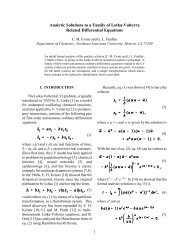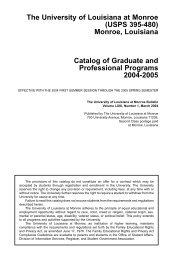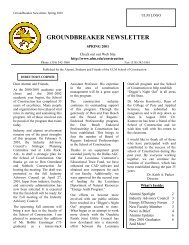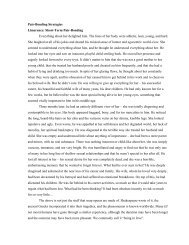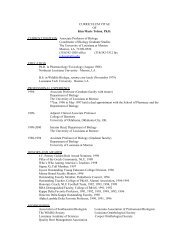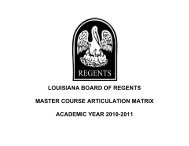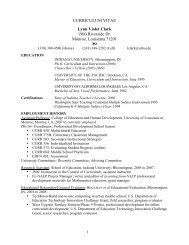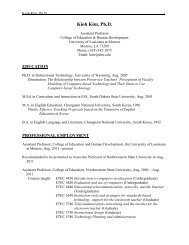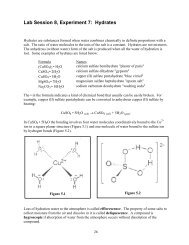Undergraduate Catalog - University of Louisiana at Monroe
Undergraduate Catalog - University of Louisiana at Monroe
Undergraduate Catalog - University of Louisiana at Monroe
Create successful ePaper yourself
Turn your PDF publications into a flip-book with our unique Google optimized e-Paper software.
2012-2013 UNDERGRADUATE CATALOG<br />
hours during a term or more than six semester hours<br />
in any part-<strong>of</strong>-term less than ten weeks. Under special<br />
circumstances, students with a cumul<strong>at</strong>ive GPA <strong>of</strong> <strong>at</strong> least<br />
3.25 may request an extension <strong>of</strong> this limit to 21 semester<br />
hours through the Registrar’s Office. Other students with<br />
special circumstances may request a similar extension<br />
through their dean’s <strong>of</strong>fice.<br />
<strong>Undergradu<strong>at</strong>e</strong> students registered for six or more<br />
hours <strong>of</strong> student teaching are limited to 15 semester hours<br />
in a term except as approved by the Dean <strong>of</strong> the College<br />
<strong>of</strong> Educ<strong>at</strong>ion and Human Development.<br />
<strong>Undergradu<strong>at</strong>e</strong> students who schedule 12 or more<br />
semester hours for credit during a term are considered full<br />
time students. Audited courses are excluded from these<br />
totals. Because other agencies may define full-time st<strong>at</strong>us<br />
differently, students who receive any type <strong>of</strong> financial aid<br />
(including aid awarded by the Veterans Administr<strong>at</strong>ion or<br />
other agencies) are encouraged to contact the respective<br />
agency to determine the number <strong>of</strong> semester hours<br />
required to receive th<strong>at</strong> aid.<br />
The <strong>University</strong> does not guarantee th<strong>at</strong> a student will<br />
be able to schedule every class which he or she may be<br />
required or wish to take during a given enrollment period.<br />
AUDITING COURSES<br />
Students may be admitted to regular classes for<br />
audit by meeting admission requirements, receiving the<br />
approval <strong>of</strong> the instructor’s academic dean, and by paying<br />
tuition for the class. An audit may not be changed to<br />
credit, or vice versa, after registr<strong>at</strong>ion closes. Students<br />
auditing courses will not receive credit, nor will they be<br />
permitted to take a credit examin<strong>at</strong>ion (departmental<br />
exam) on work audited. Credit hours for courses audited<br />
are figured in fee assessment, but not for certific<strong>at</strong>ion <strong>of</strong><br />
enrollment st<strong>at</strong>us (full-time/part-time). Any student using a<br />
fee waiver cannot register for audit.<br />
GRADING SYSTEM<br />
Grades and the grading process are major<br />
components <strong>of</strong> a university’s academic standards. An<br />
important pr<strong>of</strong>essional oblig<strong>at</strong>ion <strong>of</strong> a university pr<strong>of</strong>essor<br />
is the determin<strong>at</strong>ion <strong>of</strong> grades. Grades accomplish<br />
two essential purposes: (1) they communic<strong>at</strong>e to the<br />
academic community and to the community <strong>at</strong> large a<br />
certified level <strong>of</strong> academic achievement, and (2) they<br />
provide realistic and reliable feedback for students to use<br />
in evalu<strong>at</strong>ing individual progress and making decisions<br />
about future behavior.<br />
Prerequisites to effective grading are (1) appropri<strong>at</strong>e<br />
scope, depth, and degree <strong>of</strong> difficulty for each course;<br />
(2) controls to ensure th<strong>at</strong> students have proper<br />
academic qualific<strong>at</strong>ions for enrolling in each course;<br />
and (3) adequ<strong>at</strong>e measures <strong>of</strong> performance. Taking into<br />
account all students who would properly and typically<br />
enroll in a given course (not just those in one course),<br />
pr<strong>of</strong>essors assign grades according to the following<br />
general guidelines:<br />
UNIVERSITY REGULATIONS 71<br />
A— EXCELLENT—Performance approaches complete<br />
mastery <strong>of</strong> the course requirements.<br />
B— GOOD—Performance is above the level expected<br />
from most students, but does not approach<br />
complete mastery <strong>of</strong> the course requirements.<br />
C— AVERAGE—Performance is about the level<br />
expected from most students.<br />
D— BELOW AVERAGE—Performance is <strong>at</strong> or above<br />
the minimum level to pass, but does not allow for<br />
progression in some programs.<br />
F— FAILURE—Performance is below the minimum<br />
level to pass the course.<br />
NOTE: See College <strong>of</strong> Health Sciences-School <strong>of</strong><br />
Nursing for additional grades assigned to<br />
pr<strong>of</strong>essional nursing students.<br />
The grades “A” (excellent), “B” (good), “C” (average),<br />
“D” (below average), “F” (failure), “AU” (audit does not<br />
imply class <strong>at</strong>tendance), “W” (withdrew), “I” (incomplete),<br />
“IP” (in progress), “CR” (credit), and “NC” (no credit) are<br />
given to indic<strong>at</strong>e the quality <strong>of</strong> a student’s work.<br />
Each semester hour with the grade <strong>of</strong> “D” carries one<br />
quality point; each semester hour with the grade <strong>of</strong> “C”,<br />
two quality points; each semester hour with the grade <strong>of</strong><br />
“B”, three quality points; and each semester hour with the<br />
grade <strong>of</strong> A, four quality points. Grades <strong>of</strong> “F” and “I” carry<br />
zero quality points and are used to determine the grade<br />
point average. Grades <strong>of</strong> “CR”, “NC”, and “IP” carry no<br />
quality points and are not used to determine the grade<br />
point average. Therefore, a “C” average is a 2.00 average.<br />
An “I” grade is computed as an “F” grade unless changed<br />
to a final passing grade. Also, + and - grade design<strong>at</strong>ions<br />
are not recognized.<br />
Instructors are encouraged to abide by the<br />
<strong>University</strong> Calendar by <strong>of</strong>fering courses within the<br />
established enrollment period d<strong>at</strong>es. Instructors must<br />
discuss in advance with the Registrar the reasons for<br />
the award <strong>of</strong> “IP” grades. Valid reasons for considering<br />
the issuance <strong>of</strong> “IP” grades may be when an instructor<br />
anticip<strong>at</strong>es th<strong>at</strong> either the n<strong>at</strong>ure <strong>of</strong> a specific gradu<strong>at</strong>e or<br />
undergradu<strong>at</strong>e course or the expect<strong>at</strong>ions <strong>of</strong> all students<br />
(not an individual student) cannot be completed within the<br />
established enrollment period d<strong>at</strong>es. Letter grades must<br />
be awarded by an agreed upon deadline between the<br />
instructor and the Registrar in the event th<strong>at</strong> “IP” grades<br />
are issued.<br />
Students in developmental courses shall be eligible<br />
to earn grades <strong>of</strong> “A”, “B”, “C”, “NC”, “F”, “W”, or “I” in<br />
such courses. However, successful completion <strong>of</strong> a<br />
developmental course requires a grade <strong>of</strong> “A”, “B”, or<br />
“C”; students receiving any lower grade must repe<strong>at</strong><br />
the course. A student who has excessive unexcused<br />
absences or who is guilty <strong>of</strong> che<strong>at</strong>ing/plagiarism in a<br />
developmental course will receive an “F” for the semester<br />
grade. Those courses defined as developmental are<br />
English 0090 and M<strong>at</strong>hem<strong>at</strong>ics 0093.



